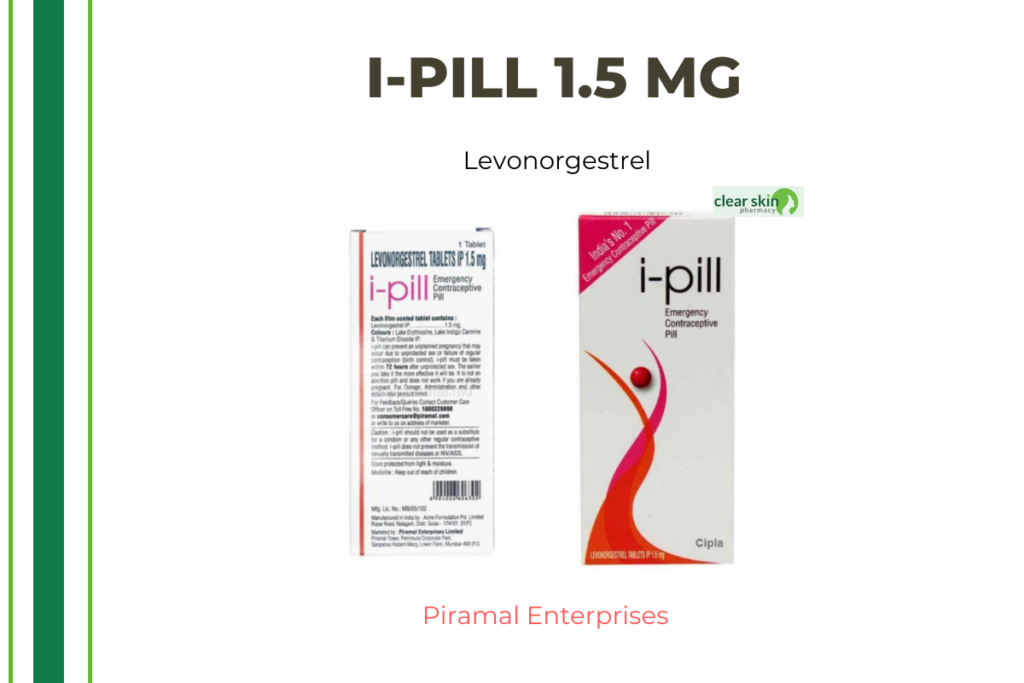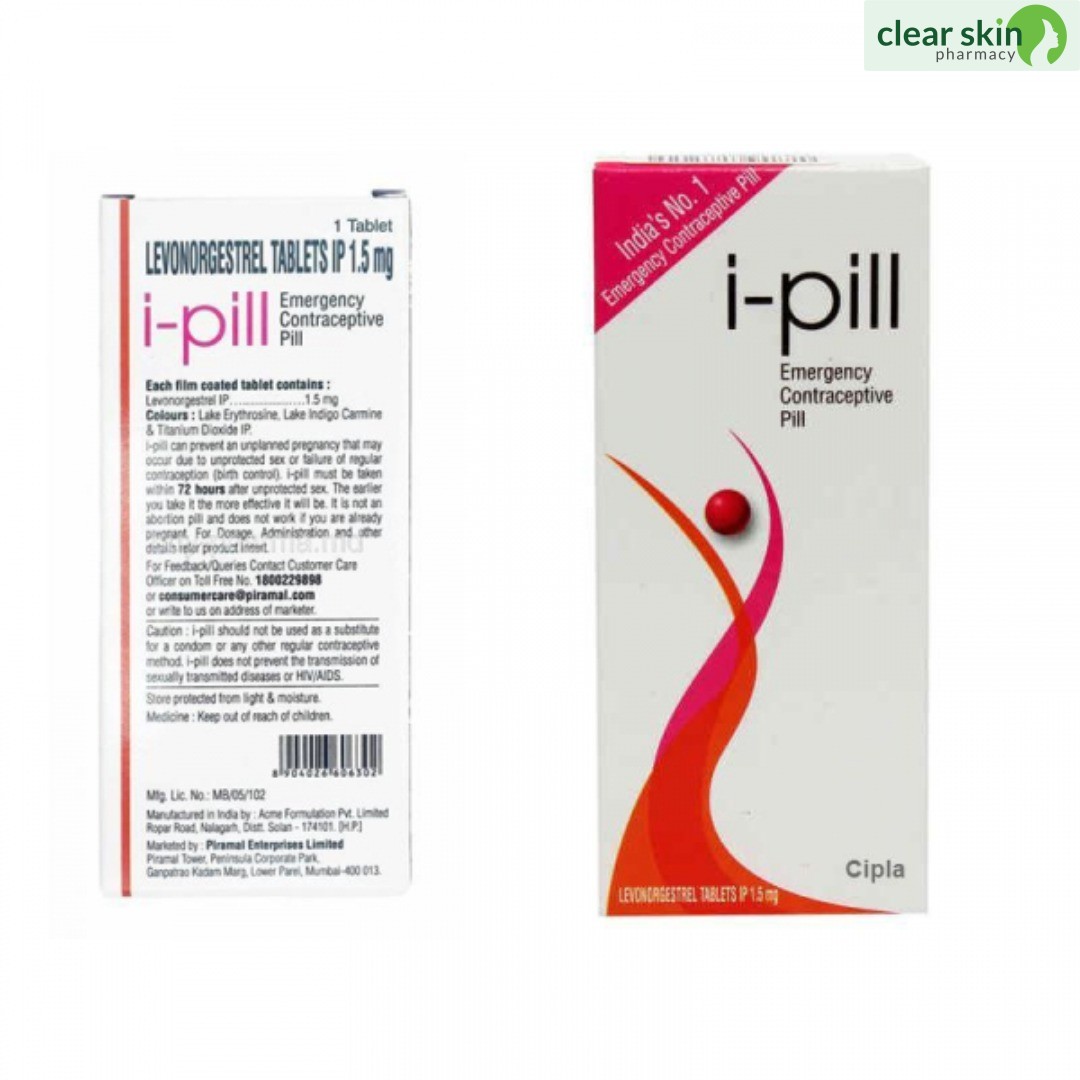I-Pill
I-pill Tablet is a hormonal birth control method. It is a highly effective birth control pill that many women use to avoid pregnancy.
About I-Pill
I-Pill is a female hormone called progestin, which is a form of progesterone. It is used to prevent unintended pregnancy and in hormone therapy. I-Pill can be used alone as emergency birth control or as a hormonal birth control pill that is released from an intrauterine device (IUD). I-Pill is the emergency birth control method that most people use. Unwanted pregnancy is when someone gets pregnant when they don’t want to or don’t want any more children. Also, pregnancy happens at the wrong time, such as when it happens earlier than wanted.
I-Pill has a drug called “Levonorgestrel,” which stops an egg from being released from the ovary (female reproductive cells) or stops a sperm from fertilizing an egg (male reproductive cells). The I-Pill might also change the lining of the uterus to stop a pregnancy from happening. If you are already pregnant, the I-Pill doesn’t do anything, so it does not cause an abortion.
I-Pill should be taken as soon as possible after unprotected sex or a failed birth control method, but no later than 72 hours (3 days). It comes as a tablet that you should swallow with a glass of water. An intrauterine device (IUD) should only be put in by a doctor in the hospital. In some cases, you might feel sick, throw up, have lower abdominal pain, be tired, have a headache, have diarrhea, feel lightheaded, or have uterine bleeding. Most of these I-Pill side effects get better over time. But if the side effects don’t go away, you should talk to your doctor.
If you are allergic to I-Pill or any of its ingredients, don’t take it. If you are already pregnant, don’t take the I-Pill because it won’t stop the pregnancy. If you are breastfeeding, talk to your doctor before taking I-Pill, as it may get into the milk and harm the baby. Do not take I-Pill if your heart has an artificial valve, if you have high blood pressure or high blood cholesterol (more fat in your blood), if you have asthma, if you have problems with blood clots or bleeding, if you have liver or kidney disease, if you have low hemoglobin, if you have salpingitis (inflammation of the fallopian tubes), or if you are otherwise malnourished. I-Pill is known to make people sleepy, so they shouldn’t drive or use machinery. St. John’s Wort is a natural treatment for mild depression that shouldn’t be taken with I-Pill because it is known to interact with it.

Uses of I-Pill
Emergency contraception
Medicinal Benefits
Levonorgestrel, which is in the I-Pill, is a female hormone called a progestin. It is used for emergency birth control within 12 hours and no later than 72 hours (3 days) after unprotected sex or a failed birth control method. It works by stopping an egg from coming out of the ovary (female reproductive cells) or by stopping sperm from fertilizing an egg (male reproductive cells). The I-Pill might also change the lining of the uterus to stop a pregnancy from happening. If you are already pregnant, the I-Pill doesn’t do anything, so it does not cause an abortion.
Directions for Use
I-Pill should be taken in the amount and for the amount of time that your doctor tells you to. Take I-Pill with food to keep your stomach from getting upset. Don’t chew it or break it up, just swallow it whole.
Safety Information
Keep somewhere cool and dry, out of the sun.
Keep away from children.
Storage
Keep in a cool, dry place out of the sun.
Key Ingredients
Levonorgestrel.
Side Effects of I-Pill
I-Pill, like all medicines, can have side effects, but not everyone gets them. Some of the most common side effects are nausea, vomiting, pain in the lower abdomen, tiredness, headache, diarrhea, dizziness, and in some cases, bleeding from the uterus. Most of the I-side Pill’s effects don’t need medical help and go away on their own over time. But if the side effects don’t go away, you should talk to your doctor.
Drug Warnings
Do not take Levonorgestrel if you are allergic to it or any of its ingredients, if you have a heart with an artificial valve, if you have high blood pressure or high blood cholesterol (too much fat in your blood), if you have asthma, if you have trouble with blood clots or bleeding, if you have liver or kidney disease, if you have low hemoglobin, if you have salpingitis (inflammation of the Fallopian tubes), or When these things happen, taking Levonorgestrel can put a person in danger of dying. Levonorgestrel is known to make people sleepy, so they shouldn’t drive or work with heavy machinery. You can’t get pregnant if you take levonorgestrel more than 72 hours after having sex without protection. Levonorgestrel won’t make you stop being pregnant if you are already pregnant, so it is not an abortion pill. St. John’s Wort, which is a natural treatment for mild depression, shouldn’t be taken with Levonorgestrel because it is known to interact with it. Be careful when driving a car because you might get dizzy or sleepy. Tell your doctor if you are a mother who is breastfeeding. Before giving it to you, your doctor will weigh the benefits and any possible risks. If your doctor doesn’t tell you to, you shouldn’t take Levonorgestrel. Levonorgestrel shouldn’t be given to kids younger than 16 years old. Levonorgestrel shouldn’t be used during the first three months of pregnancy.
Drug Interactions
Levonorgestrel interacts with medicines used to treat epilepsy (primidone, phenytoin, carbamazepine), tuberculosis (rifampicin, rifabutin), HIV (ritonavir, efavirenz), and fungal infections (medicines to treat yeast infections) (griseofulvin, ketoconazole, itraconazole, posaconazole).
Drug-Food Interactions: Levonorgestrel and St. John’s Wort affect each other (an antidepressant herbal supplement).
Drug-Disease Interaction: People with bleeding problems, confirmed or suspected ectopic pregnancy, heart disease, liver or kidney disease, vaginal bleeding, or porphyria should be careful when taking levonorgestrel (an inherited blood disease that may cause nervous system or skin problems).
Safety Advice
ALCOHOL
No bad side effects are known to happen when Levonorgestrel is taken with alcohol. But don’t drink alcohol while you’re taking Levonorgestrel.
PREGNANCY
Levonorgestrel shouldn’t be used if you are pregnant or think you might be pregnant. For more information, talk to your doctor.
BREAST FEEDING
Levonorgestrel shouldn’t be taken by a woman who is breastfeeding because it could get into the baby’s body through the milk.
DRIVING
Levonorgestrel can make it hard to drive or work with machines. But don’t drive or use machinery if you feel tired or dizzy.
LIVER
Levonorgestrel should be taken with care, especially if you have had problems with your liver in the past. Your doctor may need to change the amount you take.
KIDNEY
Levonorgestrel should be taken with care, especially if you’ve had kidney problems in the past. Your doctor may need to change the amount you take.
No Habit Forming
Diet & Lifestyle Advise
Eat a lot of whole grains, fruits, vegetables, and low-fat dairy.
The best way to lower the risk of any problem is to stop smoking and stop drinking alcohol.
If you have vaginal bleeding, you should avoid long-term stress and physical exercise like running.
Check your blood pressure every day, and if it changes too much, call your doctor right away.
About a week after taking Levonorgestrel, you should take a pregnancy test.
Try to eat and drink things every day that contain omega-3 fatty acids, which are good for your heart. You can also lower your high blood pressure with low-fat cooking oils like olive oil, soy oil, canola oil, and coconut oil.
Special Advise
Take Levonorgestrel within 72 hours (3 days) of having sex without protection or a failed birth control method.
If you have heavy vaginal bleeding after taking this medicine, call your doctor right away.
If your period is late by more than seven to ten days, you should see your doctor for a pregnancy test.
Other Information: This item is Not Returnable
Patients Concern
Unwanted pregnancy is when a woman gets pregnant when she doesn’t want to or when she doesn’t want any more children. Also, pregnancy happens at the wrong time, such as when it happens earlier than wanted. Most unplanned pregnancies happen because people don’t use birth control or use it inconsistently or wrongly.
FAQs
Levonorgestrel is not known to change the chances of getting pregnant in the future. Talk to your doctor for more information.
Some of the most common side effects of Levonorgestrel are nausea, vomiting, lower abdominal pain, tiredness, headache, diarrhea, dizziness, and in some cases, bleeding from the uterus.
Levonorgestrel (tablet) is not supposed to be used as a way to prevent pregnancy. It is only used to prevent pregnancy as a last resort (within 72 hours) after unprotected sex or a failed birth control method.
Levonorgestrel does not affect the ability to have children. If you don’t want to get pregnant, use a birth control method when you have sexual relations.
Do not take Levonorgestrel if you have a heart with an artificial valve, heart disease like high blood pressure or high blood cholesterol levels (more fat in your blood), a confirmed or suspected ectopic pregnancy, asthma, blood clot problems, a bleeding disorder, liver or kidney disease, anemia (low hemoglobin), or are otherwise malnourished. When these things happen, taking Levonorgestrel can put a person in danger of dying.





Be the first to review “I-PILL 1.5MG 1 pill”